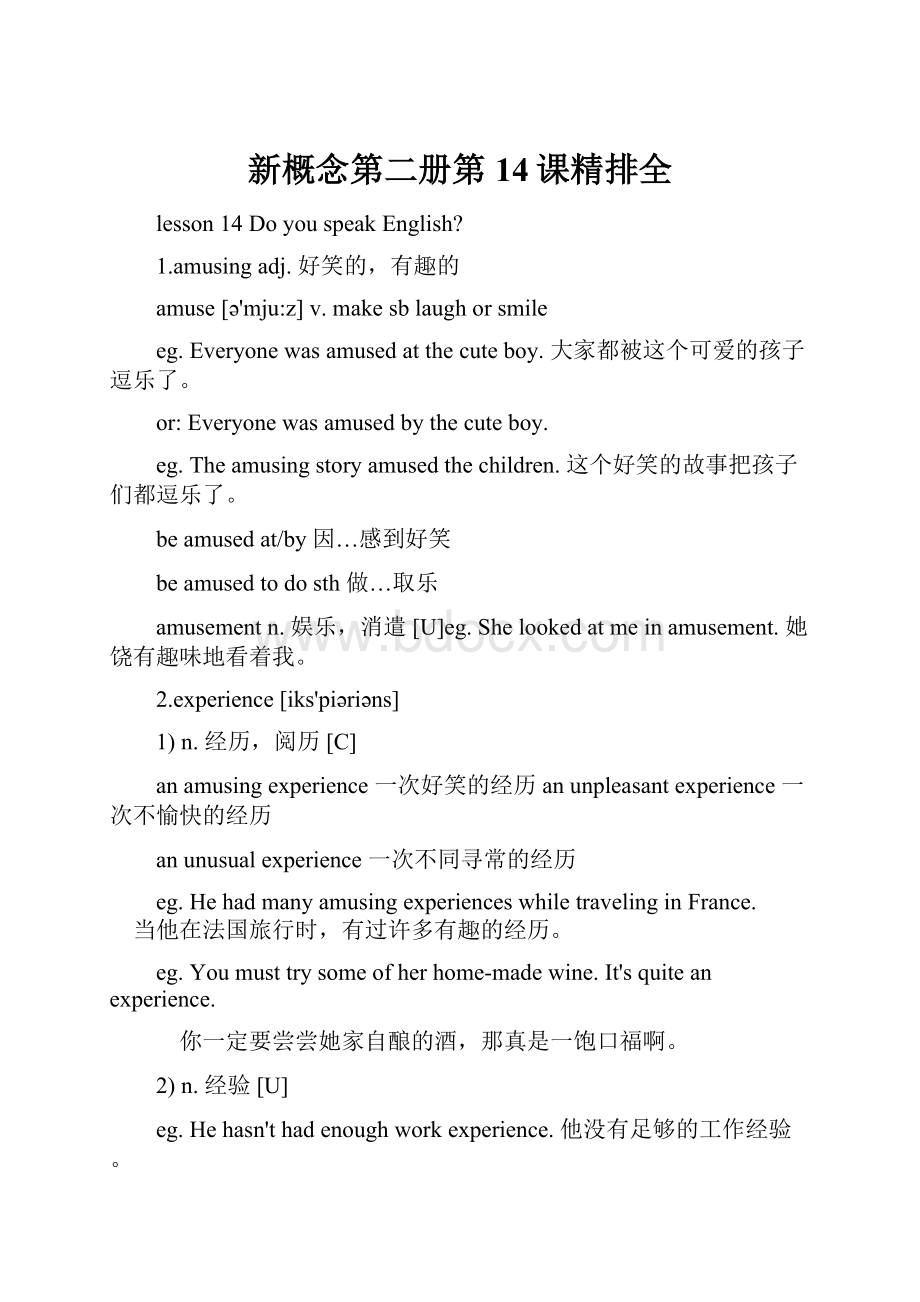新概念第二册第14课精排全.docx
《新概念第二册第14课精排全.docx》由会员分享,可在线阅读,更多相关《新概念第二册第14课精排全.docx(15页珍藏版)》请在冰豆网上搜索。

新概念第二册第14课精排全
lesson14DoyouspeakEnglish?
1.amusingadj.好笑的,有趣的
amuse[ə'mju:
z]v.makesblaughorsmile
eg.Everyonewasamusedatthecuteboy.大家都被这个可爱的孩子逗乐了。
or:
Everyonewasamusedbythecuteboy.
eg.Theamusingstoryamusedthechildren.这个好笑的故事把孩子们都逗乐了。
beamusedat/by因…感到好笑
beamusedtodosth做…取乐
amusementn.娱乐,消遣[U]eg.Shelookedatmeinamusement.她饶有趣味地看着我。
2.experience[iks'piəriəns]
1)n.经历,阅历[C]
anamusingexperience一次好笑的经历anunpleasantexperience一次不愉快的经历
anunusualexperience一次不同寻常的经历
eg.HehadmanyamusingexperienceswhiletravelinginFrance.
当他在法国旅行时,有过许多有趣的经历。
eg.Youmusttrysomeofherhome-madewine.It'squiteanexperience.
你一定要尝尝她家自酿的酒,那真是一饱口福啊。
2)n.经验[U]
eg.Hehasn'thadenoughworkexperience.他没有足够的工作经验。
eg.Iknowfromexperiencethathewillarrivelate.我从经验得出,他一定会迟到的。
3)v.经历,感受
eg.Experiencehappinessandbitternesstogether.同甘共苦。
experienced[ɪk'spɪəri:
ənst]adj.有经验的,老练的,经验丰富的
anexperiencednurse一个有经验的护士
inexperienced[ınık'spıərıənst]adj.无经验的,不熟练的
eg.Heisinexperiencedinlookingafterchildren.他照看孩子没有经验。
3.wave
1)v.指固定物体上下或往复摆动或摇动
aflagwavinginthebreeze在微风中飘扬的一面旗子
2)挥手,招手
wavetosb朝某人挥手
waveatsb
3)vt.挥动
waveahand挥手waveaflag挥舞一面旗子waveanumbrella挥舞一把雨伞
wavesbgoodbye同某人挥手道别
wavegoodbyetosb
4.lift
1)vt.举起,抬起
eg.Theboxistooheavy;Ican'tliftit.这只箱子太沉,我抬不动。
liftone'shat举起帽子(打招呼时的动作)
2)vi.(雾,云)消散,(雨,雪)停止
eg.Thefoghaslifted.雾已经散了。
3)n.电梯elevator['eliveitə](Am)
4)n.搭便车
eg.I'llgiveyoualifttowork.我会捎你去上班。
askforalift要求搭车
hitch[hitʃ]alift搭车
5)n.(心情的)高涨,飞扬
eg.Thevictorygaveourspiritsalift.那场胜利使我们精神为之一振。
6)liftboy电梯服务员/elevatoroperator(Am)
5.replyvi.回答,答复
eg.Shehasrepliedtomyletter.她已经回我信了。
replytoaquestion回答一个问题
6.answer
1)vt.(用语言,行为的)回答,答复
eg.Didyouanswerherletter?
你回复她的信了吗?
eg.Iansweredhisinsultwithablow.我对他的侮辱报之一拳。
2)vt.应接,应答
answerthedoor去开门
answerthetelephone接电话
3)answerback/talkback顶嘴
4)answerfor代表,对某事负责
eg.Itwillanswerforourpurpose.那代表我们的目的。
respondvi.
1)回答,应答
eg.Shedidn'trespondtomyquestion.她没有回答我的问题。
eg.Shedidn'trespondtomyletter.她没有给我回信。
2)对…做出回答或反应
eg.Herespondedtotheinsultwithapunch.他对侮辱的反应是重重的一拳。
6.language
1)n.语言
speakalanguage讲一门语言
spokenlanguage口语
writtenlanguage书面语言
languageteaching语言教学
aforeignlanguage外语
thesecondforeignlanguage第二外语
one'snativelanguage母语
2)n.文字等以外的传达信号,人造语言
bodylanguage肢体语言
signlanguage手势语
7.journeyn.旅行,通常指长途陆路直接到达的旅行
alongtrainjourney长途火车旅行
goonone'slastjourney去世
tripn.(美)包括乘短途交通工具以及徒步远足的所有旅行。
(英)通常指短途的观光旅行
abustrip汽车旅行
abusinesstrip商务旅行
takeatrip去旅行
voyage航海航行,乘船旅游
eg.Goonavoyagearoundtheworld.做环游世界的旅行
or:
Makeavoyagearoundtheworld.
or:
Takeavoyagearoundtheworld.
eg.Heisthenowonthevoyagehome.他正在回航途中。
tripv.绊倒
eg.Shetrippedoverthecarpetandfell.她在地毯上绊倒了。
KeyStructures
过去完成时:
由had+过去分词构成,它表示过去某时或某动作发生之前已经完成的动作或情况,即过去的过去。
1)很多情况下没有明显的时间状语,时间由上下文表示出来,这时过去完成时表示的动作在另一过去的动作之前发生,也就是过去的过去,用过去完成时。
eg.Theyfulfilledtheplanearlierthantheyhadexpected.
eg.Withtheirhelp,IrealizedthatIhadbeenwrong.
2)在包含when,assoonas,after,until,before等连词的复合句中,如果主句句谓语和从句谓语表示的过去动作是在有同时间发生的,那么发生的动作通常用过去完成时。
eg.WhenIwokeupithadalreadystoppedraining.
eg.Ihadn’thadanyfoodbeforeIcamehere.
eg.Shedidn’tgotobeduntilshehadfinishedherwork.
eg.Assoonasthesunhadsetwereturnedtoourhotel.
eg.Thechildrenranawayaftertheyhadbrokenthewindow.
ExerciseA
1.Shewrotetheletter.Shewenttopostoffice.(After)
Aftershehadwittentheletter,shewenttothepostoffice.
2.Hehaddinner.Hewenttothecinema.(After)
Afterhehadhaddinner,hewenttothecinema.
3.Ifastenedmyseatbelt.Theplanetookoff.(when)
WhenIhadfastenedmyseatbelt,theplanetookoff.
eg.Fastenyourseatbelt,Ihavesomethingterribletotellyou.
4.Wedidnotdisturbhim.Hefinishedwork.(until)
Wedidnotdisturbhim,untilhehadfinishedwork.
用正确的时态填空:
1.Themomenthehadsaidthis,heregrettedit.(regret)
2.Ithadbeguntorainbeforeshetookataxi.(behin)
Text
1.Ihadanamusingexperiencelastyear.AfterIhadleftasmallvillageinthesouthofFrance,Idroveonthenexttown.
leave
1)v.离开
leaveEnglandforatouroftheworld离开英国去做一次环球旅行
leaveforEngland离开去英国
leaveShanghai离开上海
leaveforShanghai离开去上海
2)辞去,退学
eg.Helefthisjobforabetterone.他辞去工作目的是为了找个更好的。
eg.Theboyleftschool.(Am)这孩子退学了。
3)takeFrenchleave不辞而别;擅自离开
excuse/pardonmyFrench原谅我说粗话(或冒犯的话)
leaveitatthat(语言行为等)就到此为止,别再说什么
south
south-南/north-北/east-东/west-西
1)n.南部,南
inthesouthof在…南部(范围之内)
onthesouthof在…以南(范围之外,接壤,相邻)
tothesouthof…以南(隔海相望)
2)adj.南面的
thesouthgateofaschool学校的南大门
3)adv.向南地
eg.Thosewindowsfacesouth那些窗户朝南。
eg.Thosewindowsfaceeast.
eg.Thosewindowsfacewest.
France
1)France[fræns]n.法兰西,法国
2)French[frentʃ]adj.法国的;法国人的;法语的n.法语
Frenchman/Frenchwoman法国人
inFrench用法语
3)Franc[fræŋk]n.(法国、瑞士、比利时等国的货币单位)法郎
4)Frenchchalk滑石粉
takeFrenchleave不辞而别
Frenchdoors落地玻璃门
Frenchwindows(Am)落地窗
Frenchfries炸薯条
chips炸薯片
drive---drove---driven
on有继续地,不停顿地
eg.Goonplease.请继续。
eg.Walkon.继续走。
2.Ontheway,ayoungmanwavedtome.
ontheway在路上
intheway拦路或用这种方式
onthewayto在去某地的路上
bytheway顺便说,顺便提
inaway=insomeway在某种意义上
inthisway用这种方式
inthatway用那种方式
getone'sownway随心所欲
3.Istoppedandheaskedmeforalift.
asksbforsth向…要求…
eg.Heaskedhismotherforakiss.他要妈妈吻他。
eg.Heaskedmeforalift.他向我要求搭车。
ask问
eg.Heaskedmeaquestionafterthelesson.课后他问了我一个问题。
4.Assoonashehadgotintothecar,IsaidgoodmorningtohiminFrenchandherepliedinthesamelanguage.
geton上车
getinto上车(强调进入车里)
getoff下车
getoutof下车(强调从车里出去)
saysthtosb对…说…
saygoodmorningtosb对…道早安
sayhellotosb向…打招呼
inFrench用法语
inChinese
inEnglish
inJapanese
inSpanish
inGerman(Germany德国)
5.Apartfromafewwords,IdonotknowanyFrenchatall.
apartfrom除了
exceptprep.除了
exceptfor
exceptdoingsth.
exceptthat
exceptfor置于句首,表示除去微不足道的瑕疵的东西,不影响大局的
except和exceptfor皆表示从总体中除掉、去掉的含义。
but"除了"常用于nobody,none,nowhere,who,all,everyone,anyone等不定代词之后。
apartfrom一种表示"除掉"相当于exceptfor;另外一种表示"除了,也"相当于besides。
besides除…之外,(而且,还有)
eg.Apartfrom/Exceptforhisnose,heisquitegood-looking.
eg.I'magoodgirlexceptformyinexperience.
eg.Yourcompositionisgoodexceptforsomespellingmistakes.
eg.Besides/Apartfromhisrightarm,hebrokehistwolegs,too.
eg.Iinvitedeveryonetomypartyexcept/butJohn.
除没邀请约翰外,我邀请了大家来参加我的宴会。
eg.IinvitedeveryonetomypartybesidesJohn.
除约翰外,我还邀请了每个人来参加我的宴会。
eg.Exceptfor/But5pence,Ihavenothingaboutme.除掉5分钱之外,我什么都没有。
eg.Ihaven'ttoldanybodybutyou.
eg.Whobutafoolwoulddosuchathing?
eg.You'llhavenobodybutyourselftoblame.除了你自己外,没有人该受你责备。
6.Neitherofusspokeduringthejourney.
notatall根本不
eg.Thankyousomuch.
Notatall.(/Youarewelcome.)
eg.I'mterriblysorry.
Notatall.(/Forgetit.)
eg.Idon'tknowanyFrenchatall./IknownoFrenchatall.
eg.Idon'tlikehimatall.
neither都不,用于两个人或两件事
whichof哪一个
eg.Whichofthetwodoyouwant?
eitherof两者之一
eg.Eitherofthemwilldo.两个中任一个都行。
neitherof两者都不
eg.Ilikeneitherofthem.两个我都不喜欢。
bothof两者都
eg.Iboughtbothofthem.
7.Ihadnearlyreachedthetown,whentheyoungmansuddenlysaid,veryslowly,'DoyouspeakEnglish?
'
reach到达
getto
arrivein+大地方
arriveat+小地方
cometo
8.AsIsoonlearnt,hewasEnglishhimself!
as正像,正如
引导非限定性定语从句
SpecialDifficulties
ask问
askforsth要求某样东西
eg.Afterthelesson,heaskedmeaquestion.
课后,他问了我一个问题。
eg.Heaskedforanapple.他要一个苹果。
except
exceptfor
apartfrom
besides
but
whichof
eitherof
neitherof
bothof
1.Exceptforaslightheadache,Ifeelallrightnow.
(Except/Exceptfor)
2.IlikethemverymuchsoIboughtbothofthem.
(neitherof/bothof)
3.Apartfrombeingabittoolong,theplaywasverygood.
(Except/Apartfrom)
4.Iaskedaquestion.Ididnotaskforananswer.
(asked/askedfor)
5.HecouldnotanswereitherofthequestionsIasked.
(neitherof/eitherof,asked/askedfor)
Exercises
1.IspeakafewwordsofFrench.Idon'tknow______French.
A.manyBmuchC.plentyofD.alittle
French不可数,不能用many
plentyof足够多的;not…plentyof不够多
notmuch=alittle一些
notalittle=much很多
分析:
A许多;C充足的
都不能用来修饰某种语言B和D都可以用来修饰某种语言
但alittle不能用在否定句中,不可以说Idon’tknowalittleFrench.
2.Theyoungmanwavedtothewriter.He_____him.
A.salutedBgreetedCsignaledtoDnodded
分析:
A.向…致敬,向…敬礼;B.问候,向…打招呼D.点头,表示同意或打招呼C.用手势等动作向…示意
3.HerepliedinFrench.HethewriterinFrench.
A.responedB.answered
C.returneD.remarked
responded和replied用法一样,replied后面加宾语一定要加to,answer可以直接加宾语
分析:
A回答,答复,作及物动词时后面要用that引导的宾语从句,如果表示对人或某种建议作出答复,则要用to;
C回到,返回D评论,议论,注意到
B回答
4.Histales,togetherwithhiscomicalactions_____ustremendously.
A.shockedB.amusedC.offendedD.disturbed
分析:
A使震惊,使震动,使休克B使发笑,使愉快
C得罪,使不愉快D打乱,打搅,扰乱
Review
过去完成时:
had+过去分词
eg.Afterhehadfinishedworkhewenthome.
eg.Assoonasthesunhadsetwereturnedtoourhotel.
eg.Whenhehadfinishedlunchheaskedforaglassofwater.
eg.Ihadnotunderstoodtheproblemuntilheexplainedit.
beamusedat表示对…感到好笑
beamusedby表示对…感到好笑
beamusedtodosth做某事来取乐
anamusingexperience一次有趣的经历
experience表示经历,阅历,做动词经历某事。
+d成形容词有经验的
beexperiencedin在某方面有经验的
waveatsb对谁挥手
wavegoodbyetosb对某人挥手告别
askforalift要求搭车
re